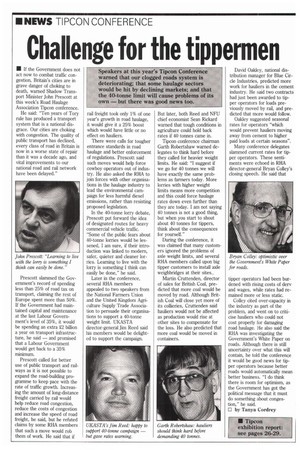Challenge for the tippermen
Page 12

If you've noticed an error in this article please click here to report it so we can fix it.
Speakers at this year's Tipcon Conference warned that our clogged roads system is deteriorating; that some haulage sectors would be hit by declining markets; and that the 40-tonne limit will cause problems of its own — but there was good news too, • If the Government does not act now to combat traffic congestion, Britain's cities are in grave danger of choking to death, warned Shadow Transport Minister John Prescott at this week's Road Haulage Association Tipcon conference.
He said: "Ten years of Tory rule has produced a transport system that is a national disgrace. Our cities are choking with congestion. The quality of public transport has declined, every class of road in Britain is now in a worse state of repair than it was a decade ago, and vital improvements to our national road and rail network have been delayed."
Prescott slammed the Government's record of spending less than 25% of road tax on transport, claiming the rest of Europe spent more than 50%. If the Government had maintained capital and maintenance at the last Labour Government's level of 35%, it would be spending an extra 22 billion a year on transport infrastructure, he said — and promised that a Labour Government would get back to a 35% minimwn.
Prescott called for better use of public transport and railways as it is not possible to expand the road-building programme to keep pace with the rate of traffic growth. Increasing the amount of long-distance freight carried by rail would help reduce road congestion, reduce the costs of congestion and increase the speed of road freight, he said, but he refuted claims by some RHA members that such a move would rob them of work. He said that if rail freight took only 1% of one year's growth in road haulage, it would give it a 25% boost which would have little or no effect on hauliers.
There were calls for tougher entrance standards in road haulage and better enforcement of regulations. Prescott said such moves would help force cowboy operators out of industry. He also asked the RHA to join forces with other organisations in the haulage industry to lead the environmental campaign for less harmful diesel emissions, rather than resisting proposed legislation.
In the 40-tonne lorry debate, Prescott put forward the idea of designated routes for heavy commercial vehicle traffic. "Some of the public fears about 40-tonne lorries would be lessened, I am sure, if their introduction was linked to modern, safer, quieter and cleaner lorries. Learning to live with the lorry is something I think can easily be done," he said.
Later in the conference, several RHA members appealed to two speakers from the National Farmers Union and the United Kingdom Agriculture Supply Trade Association to persuade their organisations to support a 40-tonne weight limit. UKASTA director-general Jim Reed said his members would be delighted to support the campaign. But later, both Reed and NFU chief economist Sean Rickard warned that tough conditions in agriculture could hold back rates if 40 tonnes came in.
Tipcon conference chairman Garth Robertshaw warned delegates to think hard before they called for heavier weight limits. He said: "I suggest if we go for 40 tonnes we will have exactly the same problems as farmers today. More lorries with higher weight limits means more competition and this could force haulage rates down even further than they are today. I am not saying 40 tonnes is not a good thing, but when you start to shout about 40 tonnes for tippers, think about the consequences for yourself."
During the conference, it was claimed that many customers ignored the problems of axle weight limits, and several RHA members called upon big tipper customers to install axle weighbridges at their sites., Martin Cruttenden, director of sales for British Coal, predicted that more coal would be moved by road. Although British Coal will close yet more of its collieries, Cruttenden said hauliers would not be affected as production would rise at other sites to compensate for the loss. He also predicted that more coal would be moved in containers. David Oakley, national distribution manager for Blue Circle Industries, predicted more work for hauliers in the cement industry. He said two contracts had just been awarded to tipper operators for loads previously moved by rail, and predicted that more would follow.
Oakley suggested seasonal rates for operators "which would prevent hauliers moving away from cement to higher paid loads at certain seasons".
Many conference delegates slammed current rates for tipper operators. These sentiments were echoed in RHA director-general Bryan Colley's closing speech. He said that tipper operators had been burdened with rising costs of dery and wages, while rates had remained more or less static.
Colley cited over-capacity in the industry as part of the problem, and went on to criticise hauliers who could not cost properly for damaging road haulage. He also said the RHA was investigating the Government's White Paper on roads. Although there is still uncertainty over what this will contain, he told the conference it would be good news for tipper operators because better roads would automatically mean better business. "1 do think there is room for optimism, as the Government has got the political message that it must do something about congestion," he said.
0 by Tanya Cordrey




















































































































































